They desperately want to raise rates, but….
By Larry Kummer, Editor of the Fabius Maximus website
What will the Fed do during the next few months? They might not know either. But we can read between the lines to see their thinking, such as we see with this speech by Atlanta Fed President Dennis Lockhart: “Assessing Economic Conditions for Liftoff,” in which he shares his analysis of the US economy. It contains several real gems:
I’ll start with the economic top line, so to speak. That is growth of gross domestic product, or GDP. Real GDP is estimated to have grown at a 2.1% annual pace in the third quarter. Excluding weakness in the export sector as well as inventory reductions, the component of GDP called real final domestic demand rose at an annual rate of 2.9%. … All things considered, I think a moderate pace of growth should be sustainable.
This is daft in several ways.
First, the trend in real GDP. Any signs of liftoff? Looking ahead, the Atlanta Fed’s GDPnow model forecasts +1.9% growth for Q4 — still in the trend, no signs of acceleration:
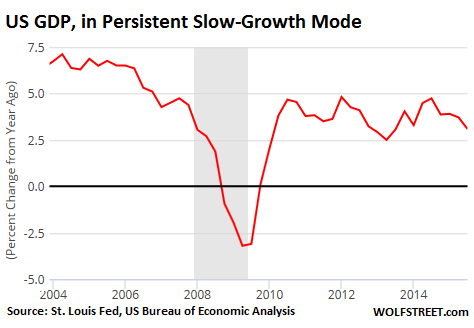
Second, GDP is strong only if one ignores the weaknesses — like exports and inventory reductions. But we should expect the export numbers to continue to deteriorate, as the US dollar has risen and the economies of our major trading partners have weakened [US Exports & Manufacturing Debacle Covered up by Oil].
As for the inventory reductions Lockhart mentioned, the October inventory-sales ratio tells us that business inventories have piled up to extreme levels not seen since the Financial Crisis, and that business will try to bring them back down by slashing prices and whittling down orders. Inventory reductions cut into GDP, exactly like those phenomenal inventory increases inflated GDP starting in late 2014. So many more of those inventory reductions lie ahead unless the economy finally performs a miracle and lifts off quickly.
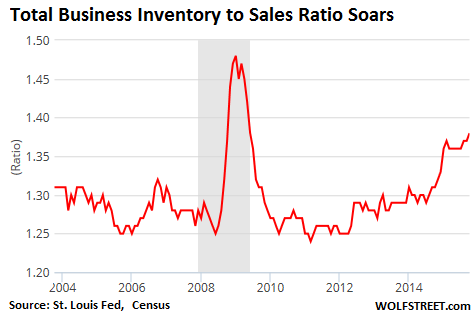
Third, GDP is a lagging indicator. Relying on GDP to steer the economy is driving while watching the rear-view mirror. Later he looks at a second indicator.
Let me turn now to employment. … a run of strong numbers for an extended period of time — like the average gain of 234,000 jobs per month we’ve experienced the past two years — gives me substantial confidence that the employment growth trend is for real … In my opinion, the Committee’s criterion {set March 2015} of “further improvement in labor markets” has been met. And further “further improvement” is certainly attainable.
This is not as odd at is sounds. Although employment is considered a lagging indicator, it began declining well before the past three recessions. But as with his remarks about GDP, the numbers do not closely match the picture Lockhart paints. Although non-farm payrolls still rise, their rate of growth (year-over-year) peaked in February and has fallen steadily since then.
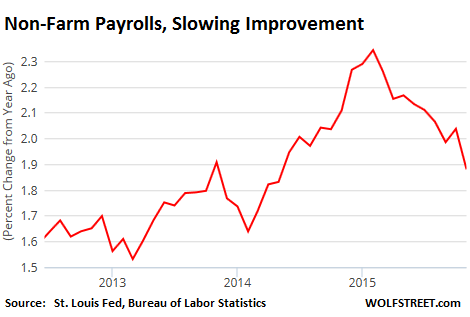
There are broader ways to measure the health of the job market, including the Fed’s Labor Markets Conditions Index, based on 19 seasonally adjusted indicators. The following graph shows the monthly change: slowing, like so many other indicators, since December 2014 — and stalled in November, and approaching the -0.8 drop in March, when the Fed set its conditions for a rate increase:
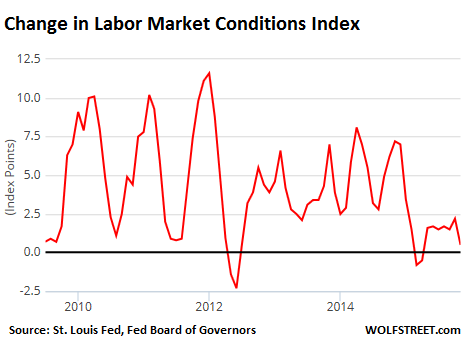
Lockhart turns to another employment indicator.
I think the economy is closing in on full employment. As we approach that condition, I would expect to see confirming evidence that labor markets have tightened up. Such evidence might come in the form of wage growth. The trend in wage growth has been weak for some time, but it may be picking up. In October, average hourly earnings increased at a 4.4% annual rate, well above the postrecession trend of just over 2%.
Since the crash, economists have remained confident that the economy would rapidly return to normal growth. October’s spike in average hourly wages (below, circled in blue) might herald the arrival of Spring, but probably not.
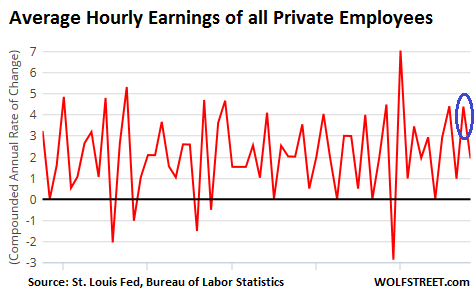
So what’s going on here?
The Fed governors are intelligent and educated, backed by the Fed’s legendary corps of 500 economists. Why does Lockhart’s speech match reality so poorly? Like so much these days, it goes back to an insight of Lord Keynes in his 1936 General Theory.
Most, probably, of our decisions to do something positive … can only be taken as the result of animal spirits — a spontaneous urge to action rather than inaction, and not as the outcome of a weighted average of quantitative benefits multiplied by quantitative probabilities.
It took generations for economists to fully realize the implications of this: animal spirits can be made to order.
Presidents such as Hoover and Kennedy have used “jawboning” to influence corporations; leaders have always made brave speeches to maintain public confidence. But Central Banks can do much more by using their powers to shape our expectations and so boost the economy. Paul Krugman wrote about this in 1998, but it caught the imagination of economists after Mike Woodward’s paper at the Jackson Hole conference in 2012.
Talk became one of the Fed’s most powerful tools, especially when rates dropped to zero, rendering many of their standard tools of little use. They desperately want to raise rates, so that they’ll have some ammo to fight the next recession, which they might already need in 2016. But raising rates will further pressure an economy already in slow gear. So they talk up our confidence – dodging economic realities if needed – to minimize the impact of rising rates. By Larry Kummer, Editor of the Fabius Maximus website.
And they’ve got some challenges ahead, autos among them. They impact various parts of the economy in a big way. Read… What Happens When the Auto-Loan Boom Blows Up
Enjoy reading WOLF STREET and want to support it? You can donate. I appreciate it immensely. Click on the mug to find out how:
![]()


Talk is cheap.
Will they or won’t they?
All this “talk” of the Fed raising rates 1/4 of 1% or 0.25% is meaningless!
More like two passengers on the sinking Titanic, arguing about whether their deck chairs should be against the bulkhead or six inches away from it!
The fed needs to raise rates above zero….so they can lower them again in the future. ;)
Ahem…FED doesn’t have to do anything that makes common sense.
Lowering rates this low was mistake they done in first place and now either way they go it will not benefit main street. They might even stay put because bonds business is going down the toilet.
And they also have option to go negative rate, now or in the future.
Twenty first century business (as usual), no common sense-no surprises.
I don’t interpret Keynes’ statement the same way. I think he was saying that there’s an urge to “do something” instead of reflect and analyze. I’m not sure it’s just “animal spirits”. There’s also a lot of external pressure. When there’s a crisis there’s a huge public uproar demanding that government “do something”.
‘When action grows unprofitable, gather information; when information grows unprofitable, sleep.’ – Ursula K. LeGuin
Unfortunately the public usually conflates motion with progress.
“I think the economy is closing in on full employment”
What color is the sky on his planet?
I’d like to see rates slowly ratcheted up to 5%. Low rates per se don’t encourage borrowing and investment. People borrow to build businesses when they anticipate increased demand. If no one is buying hot dogs it doesn’t matter what rates are – nobody will borrow money to build a new hot dog factory.
The financial engineering Wolf has discussed repeatedly is a symptom of this phenomenon. Businesses see no gain in expansion so they borrow to buy back shares at historically astronomical prices instead of making capital investments. Or even more perversely, they use their money to purchase favorable legislation and regulations. Either way, the money is not used constructively.
Furthermore, slashing rates drove a lot of people out of retirement and caused many more to defer retirement. That has contributed to unemployment among young people.
Small businesses are often started with savings but what’s the return on savings? There’s quite a difference between saving for 10 years compounded at 5% vs 0.1%.
If the Fed raises rates and we get a recession they will be blamed for a repeat of 1937. They know this and concern about their image supersedes their concern for this country. We need people with the courage and vision to do what’s right even though it will be painful. What would be more painful is to let this persist until it all collapses. And besides, underneath the asset inflation is a recession that never really ended.
Yes it will hurt people with dollar denominated debt but that’s how markets punish people who don’t understand currency risks. It will also puncture the stock and bond market bubbles. Short term pain vs turning into Japan.
Unfortunately these cowards and morons are starting to rumble about how leaving the Fed’s balance sheet bloated is ok.
I’m in Dubai at the moment for a short break. The winter sun is shining, and the gentle breeze from the creek is refreshing. This is one of many ground zeros for the ongoing collapse of oil. Along the main drag, I see entire towers for let, many consumers wondering around…but very little shopping. Even the Chinese tourists appear to be browsing and taking selfies, Rather than gorging on their consumerist desires. And where are the cash infused Russians? — not many around it seems. The local government controlled newspaper seems most concerned with the collapsing oil and property prices— what else is there?
Frankly, the city is the dystopian realization of hyper consumerist corporatism, all flash, but no substance…and when the juice that makes the city go round (in this case hot cash from oil) comes to a standstill…the entire edifice cracks to its foundation. However, it’s endlessly fascinating to witness. I have no sympathy for the sheiks. If anything, I feel for the lowly underclass of (mostly Asian and south East Asian) workforce that are no more than slaves. Is this the future of globalization? Or a failed experiment in soulless hyper corporate consumerism. The world deserves better that’s for sure.
I agree with you but on two counts.
First, at this point a recession is sorely needed, for no other reason than to remind those handling the hot money consequences still exist and to purge at least some malinvestment from the system. Volcker, for all his other faults, understood this very well when sent rates into double digit territory back in the 80’s. He knew the cure for Stagflation passed through a recession, but he also knew if handled properly recessions are relatively short-lived events.
Second, the Bank of Japan already tried to normalize rates by baby steps between 1989 and 1990 not so much as to kill the Zaitech Bubble but to make it more “manageable”. At first it seemed to work but, all of a sudden, the Nikkei and the real estate market crashed.
The BOJ directors panicked and started slashing rates again in an attempt to contain the rout. Not only they failed, but their policies resulted in the Two Lost Decades (now threatening to become the Three Lost Decades) and were the prime cause of the 1997 Asian Crisis.
The big problem with the two courses of action is a lot has changed since 1990.
Japan lost its spot to China and, to avoid the 2008 recession from fully running its course, we’ve had seven years of stagnation/depression (depending on which country you live in) on Main Street.
Debt loads have increased exponentially: even the record budget deficits Reagan ran back in the days are small fries compared to the debts run by corporations to fuel their stock buybacks programs and M&A binges.
Make no bone about it: if the Fed “stays the course” and steadily hikes interest rates over the next couple of years, a recession will hit, and hit hard. If, instead, they just content themselves with their token 25bps hike, we’ll see a continuation of the present trends: pieces falling off all over the place and bubbles inflating and deflating without any ability to control them.
In short Janet Yellen and her colleagues are faced with a terrible dilemma: have a recession in the near future or somehow attempt to procrastinate, keep Main Street mired in a stagnation as long as possible to avoid the political fallout of a full-blown recession, keep Wall Street from throwing too loud of a hissy fit and hand the problem over to their successors.
Neither is pleasant but something needs to be done.
There is also the calculus of a Presidential election next year to consider.
That’s a real wild card! Fear for the world if a GOP is elected!
‘The Fed and Lay’s Potato Chips!’
Unwarranted Fed rate hikes, like eating Lay’s potato chips, are rarely done just once.
Will the Fed raise rates tomorrow as expected and then what will be its plan going forward?
Read the article at LI here: http://go.shr.lc/1P4Go6K
Yes the Fed will finally raise a 1/4% tomorrow. They have been preparing the world for this over the past year plus. The Fed will ensure the stock market has a reasonable rally to show that this medicine is well tolerated.
The rate hike is purely symbolic; that the economy is healing, the Fed knows what it is doing and we’re on our way to “normalization”.
Then they will jawbone another year plus for the next 1/4% hike which may never come.
The world economy is very near stall speed. 1/4% increase won’t force the stall but won’t help increase lift either.
“There is no worse mistake in public leadership than to hold out false hopes soon to be swept away.”
– W Churchill
Talk works – until it doesn’t.
Rather than send the Churchill bust back to England, Obama should have kept it in his office as a reminder. Had he not been breathing in so much of his own exhaust, he might have learned something.
Obama is still talking, but no one is really listening any more. More people take the Fed’s words seriously, but I think that the Fed, too, will soon have an Obama moment. When that happens, look out below.
The worst thing the fed has done is to make themselves irrelevant to the American public. We know they don’t know what they are doing, and what they do now no longer affects us, because we can see the system is broken.
When people read that interest rates are at zero they don’t care because they have no savings. They also don’t understand how interest rates could be at zero, but their credit card rate is 24% and care loan is 10%. They only wonder what does the fed actually do? Looks like nothing.
They’ve telegraphed so many times in the last year that they have to make good on this one. They know the numbers are so cooked as to make the first few percentage points fiction. After a couple of small advances will be followed by a reduction round. Too many things are pointing towards a recession.
I don’t usually agree with arch-interventionist central planner Robert Reich but his latest column mentions something that the many believers in government statistics choose to ignore:
Many, many of today’s un- and under-employed do not even QUALIFY for unemployment benefits.
“Initial claims” and “continuing claims” are becoming irrelevant little anachronisms…
In Florida you have to be continuously employed for 20 months to qualify for unemployment. If you have a series of temporary or short term jobs you are not eligible. You should hear the republicans here scream about how the unemployed are raping the system. The top payment is about $250 a week for six months.
The scamming of UI in parts of Canada used to verge on bizarre. Haven’t looked recently but doubt its changed much.
Fishing and construction are deemed seasonal. So you work during the summer and go on UI in fall -winter (six months) when you switch to cash jobs, or not.
This goes on for decades.
I’m no saint. When the real estate market collapsed in the 80’s I owned a duplex with a couple. The gal worked in the UI center, that also distributed gov jobs. I said to her: you know I need a way to make (we had one mortgage) mortgage payments.
She got me a 20 week gig that qualified me for the max. payout for 50 weeks.
Foreclosure was narrowly avoided.
The job was with the civilian yard care on a military base ( Nanoose Naval Base) and was so slack it took me two weeks just to slow down.
Let us take a flyer, and boost rates .5% just for shits and giggles. We need not do it again for awhile. The EU may as well self-destruct now, it was an idiotic idea anyway. China is strung out on DEBt as are we, but what the hell. Might as well try to do something for the guy who has savings and investments. The poor will always be with us, as well as those who make bad choices.
We know zero rates haven’t performed any miracles here.
This would be the ideal time to raise petrol taxes n the US on a FED level. They haven’t been raised in years, and the impact would be minimum.
Do you see a Congressman brave enough to do what is needed? No, me neither.
That’s why we should never consider the incompetent incumbents.
What you really need is a VAT ( value added tax) known in Canada as GST (goods and services tax i.e., a federal sales tax.
The US is the only G20 economy without one.
In Canada a bunch of stuff is exempt- most food, clothing for kids etc.
But New Zealand which brought in the first VAT in the 70’s may be right to have NO exceptions.
But everyone hates the GST- including the rich- because for once they can’t get out of it. (Well, almost: a weird way of buying an expensive boat or plane by corporate stock transfer was around for a while, but is unusual)
The Canadian Fed’s send a check every four months to those below a certain income, the GST rebate check, that sets off a pot and beer sales boom for a day or two.
I believe US Senators Gramm and Rudman advocated for a GST but it ain’t popular.
You get some odd side effects from a VAT that need tuning.
Here’s one. Painter Tony Onley, now deceased from plane crash, ran into probs with our Feds.
The GST is a VAT; whenever value is added, tax is owed.
A sale is one way ( from wholesale to retail) but a VAT is broader than that.
Tony, like many artists was a collector of his own art. He liked some stuff on HIS wall.
He would get up, take 10 bucks worth of paint, put it on a 20 buck canvas, after a few days voila- a five grand Tony Onley.
So that’s 4,770 of value added, and Rev Can wanted its cut NOW, even though it hadn’t been sold.
The law has been amended somewhat since.
,
I’m hopeful the liberals will try some sustainable ideas to get Canada back on track. One can never underestimate the power of positive thinking….of course, the RE situation will devastate many!
I’ve heard policy people actually discussing this.